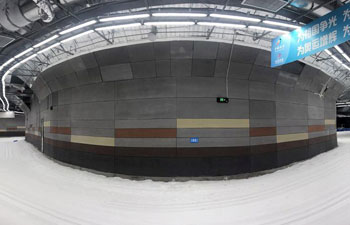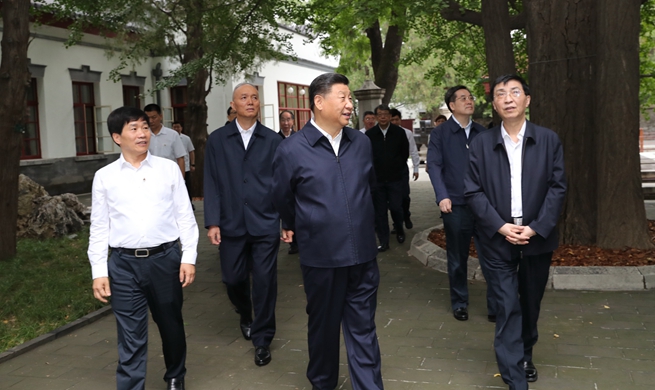GAZA, Sept. 13 (Xinhua) -- Tension between the Hamas militant group in the Gaza Strip and Israel has been mounting over the past two weeks amid Israel's upcoming parliamentary elections.
Palestinian analysts told Xinhua that Hamas is exerting pressure on Israeli Prime Minister Benjamin Netanyahu to keep the Egyptian-brokered calm understandings valid on easing the Israeli blockade on the enclave since 2007.
Hamas is looking for exploiting Netanyahu's intentions not to get involved in open military confrontations in the Gaza Strip during his elections. Otherwise, the prime minister might fail in the elections.
Over the past two weeks, Palestinian militants have been launching barrages of rockets on daily basis from the Gaza Strip into southern Israel. In return, Israel retaliates by striking on uninhabited military compounds, without leaving any casualties among the Palestinians.
Adnan Abu A'amer, a political science professor and a political analyst said "we don't know who is responsible for launching the rockets, but we still live crucial and decisive days."
"The tit-for-tat tension taking place in the Gaza Strip could always be the trigger for a comprehensive confrontation," said Abu A'amer, adding "Hamas is not the only player in Gaza ... there are other military factions in the field."
An analyst specialized in Hamas affairs said that Hamas doesn't need to give the green light for launching rockets into Israel, but it wants to make the public in Gaza satisfied amid a deteriorating humanitarian situation in Gaza.
The endless Israeli blockade that has been going on for 13 years had severely influenced the economic situation and the daily living in the Gaza Strip where official figures showed that the rate of unemployment grew up to 52 percent in Gaza.
Mohammad Hejazi, another Gaza-based political analyst, said that Hamas is looking for achieving political gains and put pressure on Netanyahu to hurry up with implementing the clam understanding to cease fire for easing the Israeli blockade.
"But I believe that the Palestinian file is not present on the agenda of Netanyahu's campaign," said Hejazi, adding that Netanyahu still focuses on enforcing the internal Palestinian division between Hamas and Palestinian President Mahmoud Abbas.
Hejazi continued that "depending on this vision of Netanyahu, he is following the policy of the carrot and the stick in dealing with Gaza issues by allowing humanitarian aid to Gaza and keeping Hamas rule of the Gaza Strip."
"Although Hamas still doesn't want to get into a war with Israel, it wants to exploit Netanyahu in this stage before holding the elections to urge him to make concessions," said Hejazi.
For months, Egypt, the United Nations and Qatar have been mediating clam in the Gaza Strip between Israel and the Hamas-led militant group. Unwritten calm understandings had been reached to reinforce a ceasefire and avoid a comprehensive confrontation.
This week, a senior Egyptian security delegation visited the Gaza Strip and held intensive talks with Hamas and other groups for two days as part of keeping the ceasefire valid between Israel and the Palestinians.
However, Hamas and other factions have been complaining that Israel didn't show any commitment to implementing the reached calm understandings on expanding work at crossing points and allowing humanitarian and financial aid to the populations.
Talal Oukal, another Gaza-based political analyst said that the militant groups in Gaza may be encouraged by Hamas trying to influence the Israeli elections by threatening the security of the Israelis.
The escalation of the confrontation may influence Netanyahu's popularity and show him unable to protect the Israelis, which may lead to his loss for the coming election, said Oukal.
Oukal believes that the Palestinians are more able to study the facts surrounding them and Israel, and Hamas is trying to seize the opportunity to implement the declared calm understandings.
Palestinian observers considered that the failure to secure the southern front of Israel and stop the marches towards the eastern border of the Gaza Strip was Netanyahu's biggest failure to form a coalition government after the last election held in March.
The recent Israeli election ended with a close result between Benjamin Netanyahu and Benny Gantz, former chief of staff of the Israeli army, head of the Blue and White party.

















